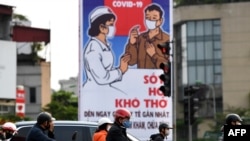Vietnam’s shops and restaurants are closed to stop the spread of the deadly COVID-19 respiratory disease. Factory work is slowing because of weak demand in other parts of the world that are under their own shutdowns.
But Vietnam has donated more than 1 million face masks overseas in an apparent sign of goodwill. Specifically, this month it sent 550,000 masks to Western Europe, a total of 200,000 to Russia and 250,000 to the United States, Vietnamese media outlets say.
The Southeast Asian country ravaged by war 50 years ago and still developing today can afford to make those donations, observers in the country say.
That’s first because the Vietnamese government is reporting a disease caseload of just 268 with no deaths, both low compared to other parts of the world despite a 97 million Vietnamese population plus a land border with the virus’s origin China. A higher load would raise domestic demand for the masks that are typically worn by hospital staff people.
Officials are using their wealth of masks to fortify relations with specific countries that are receiving Vietnamese masks, analysts believe.
“I think they want to take advantage of this situation to promote mask diplomacy and now I think the government is more confident in glossing its image internationally,” said Nguyen Thanh Trung, Center for International Studies director at the University of Social Sciences and Humanities in Ho Chi Minh City.
Deputy Minister of Foreign Affairs Bui Thanh Son handed over the 250,000 U.S.-bound masks to the American ambassador on April 16, domestic news outlet VnExpress International reported. The deputy minister personally donated $100,000 worth of face masks and other medical supplies that same day to Japan, the report said.
Vietnam especially wants good U.S. relations now, Nguyen said. The United States helps it monitor for Chinese activity in a sea that China disputes with Vietnam. Japan and Vietnam signed a memorandum in 2018 to work together on maritime issues as both hope to reign in China.
A young population and warm climate are credited with reducing the virus spread in Vietnam.
A second reason that Vietnam can make masks for donation: It's already full of garment factories, which led an early phase of industrialization. Vietnam is now an export manufacturing giant seen as an alternative to China. As of 2017, about 2.5 million Vietnamese were working in 6,000 textile and garment manufacturing companies.
Garment production machinery can make masks and gowns for medical use, said Frederick Burke, a Ho Chi Minh City-based partner with the law firm Baker McKenzie. Workers learn fast how to make the shift, too.
“Because they’re the main alternative to China in terms of capacity, the labor force is trained up to do any kind of garment, sewing, anything that needs that kind of stitching and putting together,” Burke said.
Vietnam is now seen following China and Taiwan in showing stewardship to Western countries, which are reporting some of the world's most severe COVID-19 outbreaks this month.
Taiwan has said it would give away 10 million masks to medical personnel in Europe, the United States and 15 small diplomatic allies. Donors in China have sent hundreds of thousands of masks and virus test kits abroad.
“I think it’s just goodwill sort of propaganda, helping the rest of the world, as much politics as economics,” said Adam McCarty, chief economist with Mekong Economics in Hanoi.
Not everyone in Vietnam is sold on the idea. Even if Vietnam has the capacity to send masks abroad, the government should focus on other issues, said Sky Nguyen, a Vietnam-based tour guide and YouTube travel channel operator.
“We have too many things to worry about here, and me myself don’t see the government making any move to fix it,” Sky Nguyen said, citing the agricultural impacts of drought as a problem that needs attention. Tourism, he expects, will be “dead” for a year.
But economists say Vietnam is unlikely to see mass layoffs or an economic downturn despite the shutdowns this month – which are constantly being reviewed with an eye toward reopening. Full-year economic growth is expected at 4.8%.




